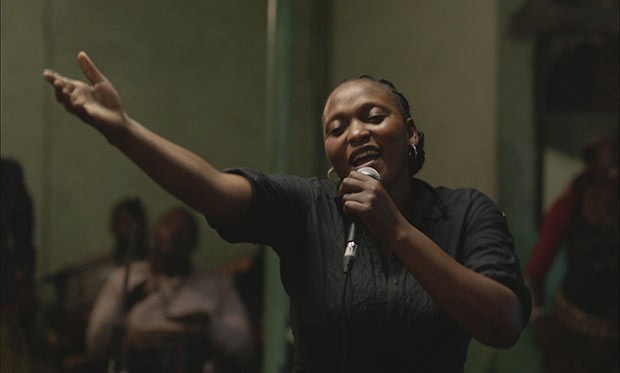It’s another steamy night in an open-air club in Kinshasa, in the Democratic Republic of Congo. The easy banter between customers establishes that this is a place of regulars. Drinks are served, romantic overtures are rejected, and finally a band sets up in the corner. A woman stands before the ensemble, and then with a strong, colorful and evocative voice begins to sing. It’s a transformative moment, as the singer, the bar patrons and the film’s viewers slip into this new space created by the performance.
A number of such scenes mark Alain Gomis’ new film, Félicité, which recently won the Jury Grand Prix at the Berlin International Film Festival. The rather loosely plotted film follows the singer, the melodically named Félicité (Véro Tshanda Beya), as she deals with both an immediate crisis and her everyday struggles. The latter is introduced first, as her ancient refrigerator breaks down and she must engage the services of a flirty repairman named Tabu (Papi Mpaka). Félicité, who makes it clear she is her own woman, has no time for silly men.
But she’ll need help when she learns that her 14-year-old son has been badly injured in a traffic accident. He’s in the hospital, but the doctors won’t operate without a large sum pre-paid. Félicité dashes around town, collecting old debts, cadging favors and passing the hat among the band. Tabu, when he’s not drinking, proves occasionally helpful.
These scenes are intercut with documentary-style footage from the streets of Kinshasa, a mostly poor city that thrums with activity; other musical interludes, including a classical-music ensemble and a choral group; and dream-like sequences of Félicité (shorn of her long braids) walking with some purpose in the forest at night. It’s all a bit disjointed and slow, so viewer patience is advised.
But the film’s elements ultimately come together to form a portrait of Félicité, as well as of life in this struggling city. It feels like a cliché to have to note the resilience, cooperation and ingenuity that keep both Félicité and her environment together. There’s a lot that needs fixing — from her son’s bones and the busted fridge, to the closed-off spot in Félicité’s heart that might need some romancing.















